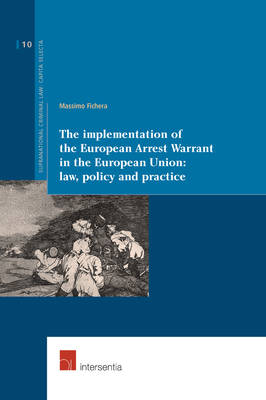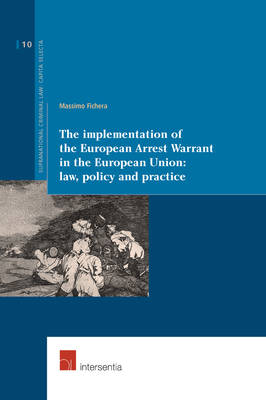
- Afhalen na 1 uur in een winkel met voorraad
- In januari gratis thuislevering in België
- Ruim aanbod met 7 miljoen producten
- Afhalen na 1 uur in een winkel met voorraad
- In januari gratis thuislevering in België
- Ruim aanbod met 7 miljoen producten
The Implementation of the European Arrest Warrant in the European Union: law, policy and practice
Massimo FicheraOmschrijving
This book provides a critical analysis of the principle of mutual recognition of judicial decisions in criminal matters in the EU, through a detailed assessment of its most prominent instrument, the European Arrest Warrant (EAW). It conceptualises and contextualises the lack of clear vision in the building up of the area of freedom, security and justice from an EU constitutional law, as well as a comparative and international criminal law standpoint.
The EAW is considered both as a test for all the other measures which have been adopted or will be adopted as part of the mutual recognition agenda, and as an evolution of classic extradition. On the one hand, its significance is viewed from the perspective of both EU law and international law, by highlighting the structural deficiencies of the former Third Pillar and the need to remedy them. On the other hand, its impact is verified not only in the context of European cooperation in criminal matters, but also in light of the more general question of the identity of the EU as a polity as well as the nature and implications of EU integration after the entry into force of the Treaty of Lisbon.
In particular, this work revolves around four main issues: first, the need to substantially re-define the concept of mutual recognition; second, the extent to which the new mechanism of the EAW effectively operates within a non-harmonised landscape; third, the exact nature and scope of mutual trust, as a notion that underpins the principle of mutual recognition in European criminal law; and finally, the tension between the need to enhance the law enforcement aspects of EU cooperation and the urge to build up a common framework of procedural rights. An overview of the implementation of the EAW in the UK and Italy, as examples of a common law and a civil law jurisdiction, is also offered.
The book is aimed primarily at academics from different backgrounds both within and outside Europe. Those with an expertise in international criminal law will gain an insight into the way consolidated principles of cooperation in criminal matters work in the EU context. Those with a general knowledge of EU law and/or the former Third Pillar will learn of the implications of extending EU integration to the area of criminal law. The book will also appeal to comparative lawyers who are not familiar with EU law. Finally, practitioners will find it useful to relate their daily work to the main doctrinal debates on the transnational dimension of criminal law.
About this book
‘This book is a most welcome addition not only to the literature on the European Arrest Warrant, but also on the ambitious legislative programme of the EU on mutual recognition in the criminal justice sphere. It is an impressive work that demonstrates depth and insight’
Bill Gilmore, Professor of International Criminal Law, Edinburgh Law School, Scotland
‘Fichera’s book makes a fine read. It is methodically researched and clearly written, appealing to the less savvy reader. Throughout its pages, the author invites the reader to anticipate that the development of EU criminal law has reached a considerable degree of maturity. […] Although Fichera has avoided the criticism of writing yet another book on EU criminal law, one can appraise him with measured enthusiasm for choosing to write a monograph on a well-travelled substantive ground of EU criminal law. […] Fichera’s monograph finds its place within the already hectic literature on the EAW. It is the first of its kind that takes stock of the Treaty of Lisbon, which has necessitated new academic analysis in a plethora of areas of EU law, including the sub-discipline of EU criminal justice.[…] Hence, Fichera’s contribution,which states the law as it was in August 2010, is timely for it portrays the further development of European criminal law outside the traditional national structures.’
Theodore Konstadinides in 2011 CML Rev. 1363
‘Commentaries on the technicalities of European legal instruments can be deathly dull and dry as dust, as devoid of personality as the robotic Eurocrats of popular imagination presumed to have drafted them. Readers prepared to give The implementation of the European Arrest Warrant in the European Union a chance may find their dismal expectations pleasantly confounded. Although the detailed law and practice of the European Union (EU) arrest warrant constitute its core focus, this hook offers a wide-ranging contextual study of 'the most remarkable mechanism of surrender in the world and one of the most significant pieces of legislation in Et: law in the last decade' (p.172). The European Arrest Warrant (EAW) is treated as an exemplar of broader trends in the development of EU policy making·, and serves as a springboard for more profound theoretical speculation. [Fichera] has produced a lively and engaging monograph on a topic of growing importance that British criminal lawyers and criminologists in general (not excepting this reviewer) know too little about. It dispels some of the clouds of ignorance swirling around the concept of 'European criminal law' and its thought-provoking discussion challenges scholars and practitioners alike to pay' more attention to current EU policies and practices and think a lot harder about the future prospects of European regulation in the field of penal law. If Fichera is even only half right about the current direction of travel, ignorance of the EU dimension should no longer he a respectable option.’
Paul Roberts in 2014 The Howard Journal of Criminal Justice 547
Specificaties
Betrokkenen
- Auteur(s):
- Uitgeverij:
Inhoud
- Aantal bladzijden:
- 253
- Taal:
- Engels
- Reeks:
Eigenschappen
- Productcode (EAN):
- 9789400001725
- Verschijningsdatum:
- 27/01/2011
- Uitvoering:
- Paperback
- Afmetingen:
- 160 mm x 240 mm
- Gewicht:
- 445 g

Alleen bij Standaard Boekhandel
Beoordelingen
We publiceren alleen reviews die voldoen aan de voorwaarden voor reviews. Bekijk onze voorwaarden voor reviews.









